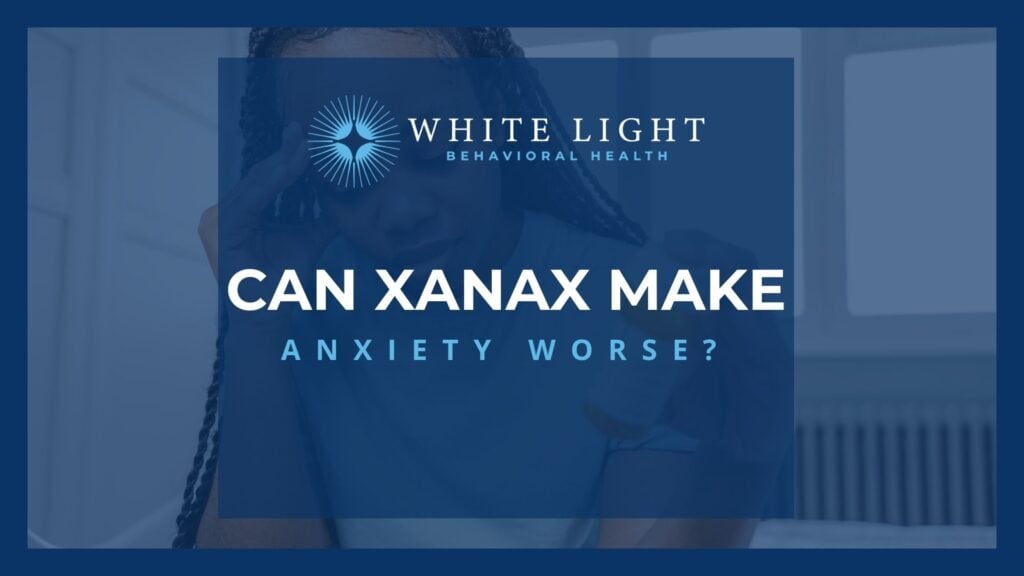Can Xanax Make Anxiety Worse?
Millions of people in the United States alone face anxiety and panic attack disorders daily. It is estimated that at least 300 million global citizens are struggling with at least one form of anxiety as per a study by Tim Newman published in Medical News Today in 2018. For those who are suffering from anxiety attacks or panic disorders, being prescribed a benzodiazepine such as Xanax can provide short-term relief and enough time to regain control of one’s mind and emotions.
Understanding the inner workings of Xanax and how it can potentially trigger anxiety in some individuals is essential before determining if Xanax, commonly known as Alprazolam, is right for you.
What Is Xanax?
Alprazolam, or Xanax, is an anti-anxiety medication that is classified as a benzodiazepine. Benzodiazepines, such as Xanax, are typically prescribed for individuals who are suffering from both acute anxiety attacks as well as extreme panic attack disorders. It is known to have a short half-life, providing nearly instant but temporary relief. However, it can be extremely useful for those who are experiencing major panic attacks or for those who are simply unable to control their anxiety due to external circumstances.
Xanax, along with a myriad of benzodiazepines on the market today, works by binding to the GABA receptors in the brain, also known as the gamma-aminobutyric acid receptors. According to the Cleveland Clinic, Gamma-aminobutyric acid is considered an amino acid and sends messages packed with chemicals that trigger calmness in the brain. This allows individuals to feel at ease while getting the relief they are seeking from an anxiety or panic attack.
Unfortunately, benzodiazepines do not only have a shorter-than-average half-life, but they can also build up quickly in the brain and body as per a study by Alyssa Peckham published in Medical News Today. This will typically result in a much higher tolerance than is typically necessary to find relief from anxiety or panic attacks. Once the brain has developed a tolerance to Xanax or another benzodiazepine, it may be more difficult to find relief with the same prescribed dosage.
Common Uses of Xanax
Alprazolam, or Xanax, is prescribed to adults and adolescents alike, depending on their diagnosis and the severity of their anxiety. In most instances, Xanax is prescribed to individuals who have been diagnosed with GAD or Generalized Anxiety Disorder. Some of the most common signs and symptoms that are most prevalent among individuals who have Generalized Anxiety Disorder include:
- Increased anxiety
- Increased sweating and palpitations
- Insomnia or other forms of sleep disturbance
- Intense fatigue
- Restlessness
- Inability to concentrate or remain focused for an extended period
- Joint stiffness and increased muscle tension
According to a report by Howard E. LeWine published by Harvard Medical School, another disorder that Xanax is commonly prescribed for is Panic Disorder. Individuals who are suffering from a panic disorder may find themselves unable to move, make decisions, or think clearly when they are experiencing an attack. Some of the most common signs and symptoms that may indicate that an individual is experiencing a panic attack include:
- Heart palpitations and increased or uncontrollable sweating
- Shortness of breath and the inability to breathe slowly and calmly
- Inability to focus and maintain concentration for any period
- Overwhelming feelings of suffocation and feeling trapped, lost, or stressed
- Chest pains, and in some cases, discomfort throughout the entire upper half of the body
- Chills and/or hot flashes
- Feeling as if you are choking
- Tingling in the arms and extremities along with numbness that will not go away immediately
- Fear of doom and death
- Fear of losing control of all aspects of your life
- Stomach issues and abdominal pain
- Bowel trouble such as nausea, vomiting, or diarrhea
What Are the Common Side Effects of Xanax?
While Xanax can be an extremely effective drug for those suffering from anxiety or panic attack disorders, it is imperative to ensure that anyone who is prescribed Xanax is taking the correct dose at the appropriate intervals. Because Xanax is fast-acting, those who take the medication may be able to begin experiencing the effects of the drug within an hour as per a study by Alan Carter published in Healthline updated in 2023. It is also important to note that Xanax’s effects will typically wear off after 11 to 16 hours, depending on the person’s metabolism and age.
When taken appropriately, individuals can expect to feel a wave of calmness and the ability to think clearly and without feeling overwhelmed. It is important to monitor an individual’s usage and consumption of Xanax, as most benzodiazepines can be highly addictive. If an individual is abusing Xanax or any other form of Benzodiazepine, there will likely be indicators. Some of the most prevalent signs and symptoms that an individual is abusing Xanax include:
- Increased sedation and visible drowsiness
- Falling asleep during the day or while attempting to work or complete other activities
- Slurred speech
- Complaints of headaches, double vision, and increased nausea
- Swollen feet or hands
- Cognitive issues and the inability to remember anything in the short-term
- Dizziness
- Increased irritability (typically when an individual no longer has access to the medication)
- Confusion
- Tremors
- Dry mouth and in some cases, a dry throat
- Loss of interest in activities, hobbies, sex, or relationships
Those abusing Xanax may find themselves with a loss of muscle coordination, drooling, or even experiencing a loss of bladder control, depending on the severity of the abuse in the individual. Individuals may also experience a wide range of intense mental and emotional side effects. A study by Dena Westphalen published in Medical News Today states that Serious and life-threatening side effects of Xanax misuse can include thoughts of suicide and suicidal ideation. Chest pains, uncontrolled muscle movements, and even hyperactivity have all been reported as serious responses to those who are overusing and abusing Xanax for an extended period. Those who abuse Xanax may also experience hallucinations, seizures, coma, and death in severe or extreme cases.
Addiction Risks Associated With Xanax
Unfortunately, benzodiazepines, and Xanax in particular, are considered high-risk for most individuals unless taken in a highly controlled environment. Benzodiazepines are not only extremely addictive, but they can build a tolerance in an individual in as little as a week when taken consistently. Long-term usage of Xanax can mean simply taking the prescribed medication for just one month.
Keep in mind that when taking Xanax or any benzodiazepines, there is an elevated risk when consuming Xanax alongside other medications or alcohol. Consuming alcohol in combination with Xanax is a leading cause of overdoses and trips to the hospital in the United States and in many other countries around the world.
Developing an addiction to Xanax can happen even if you have a legitimate panic disorder. This risk is increased if you are predisposed to addiction or have a history of substance abuse. Understanding the signs and symptoms of a benzodiazepine addiction will help you seek the proper treatment so you can regain the freedom and control you deserve in your everyday life.
Can Xanax Make Anxiety Worse?
Unfortunately, taking the prescription Xanax regularly has the power to build tolerance in the brain. Once your brain is no longer receiving the medication, you may begin to feel adverse effects of the drug, which typically involves increased anxiety or in severe cases, a full panic attack.
Before taking any prescription, including a Xanax prescription, it’s important to consider why you are being prescribed the drug and how you will be treated with the medication. Xanax will affect some individuals differently, which can result in a wide range of unpredictable symptoms and effects. Understanding how Xanax may impact an individual based on their diagnosis, condition, or anxiety disorder is highly advisable before making the decision that is right for you and your needs. For instance, those who struggle with neurotic anxiety typically find that it is their thoughts and manic behaviors that trigger their anxiety spells. Individuals who have been diagnosed with bipolar disorder can experience an increase in anxiety, irritability, and depression when taking certain medications. For those who have a serious condition such as schizophrenia, constant monitoring of mediation is imperative. In many instances, antipsychotics are prescribed to those who are dealing with schizophrenia rather than benzodiazepines such as Xanax, or Alprazolam.
Withdrawal Concerns
Clients who have consistently used Xanax likely have built a tolerance to the medication. If the medication is stopped, these individuals have a high risk of experiencing rebound anxiety. Rebound anxiety may occur any time when an individual ceases taking medication, especially when it comes to benzodiazepines such as Xanax.
In Healthline’s report medically reviewed by Philip Ngo in January 2023 stated that some of the most common withdrawal symptoms to keep in mind when it comes to benzodiazepines such as Xanax include tremors, chills and sweats, nausea, heart palpitations, vomiting, increased anxiety, uncontrollable panic attacks, and in some cases, seizures. If you believe you are at risk of seizures, a coma, or even death from a benzodiazepine withdrawal, it is imperative to seek emergency medical attention as quickly as possible. The more familiar you become with the common signs and symptoms of Xanax abuse, an overdose, or even rebound anxiety, the easier it will be for you to pinpoint when you require the help of a medical professional.
Seek Professional Help
Those experiencing Xanax addiction need to find help. Common treatments include both inpatient and outpatient services, depending on the severity of the addiction. Inpatient services are most helpful for those suffering from severe addiction. Over time, clients can improve to the point of only needing inpatient services. Meanwhile, those with less severe addictions may begin at the outpatient level. Support groups and therapy sessions are also available to clients. Cognitive Behavior Therapy is one popular treatment offered to those addicted to Xanax. It consists of helping clients develop coping mechanisms to overcome their addictions. Twelve-step support programs are also extremely beneficial to users. White Light Behavioral Health guides clients through the healing process. We strive to address the physical and emotional elements of addiction. Contact us for more information on Xanax misuse and the services we provide.
Does Xanax Have Any Long-Term Effects on Anxiety?
Yes, Xanax can have long-term effects on anxiety. While it may provide short-term relief, extended use can lead to tolerance, dependence, and rebound anxiety. Over time, the effectiveness of Xanax may diminish, and individuals may require higher doses to achieve the same level of relief.
Can Xanax Lead to Addiction?
Yes, Xanax has a high potential for addiction. It belongs to a class of drugs known as benzodiazepines, which are central nervous system depressants. Prolonged use of Xanax can lead to physical and psychological dependence, as the body becomes accustomed to the drug’s presence. Addiction to Xanax can result in cravings, compulsive use, and difficulty quitting despite negative consequences.
How Does Xanax Compare to Other Anxiety Medications?
Xanax is a benzodiazepine medication commonly prescribed for the short-term management of anxiety disorders and panic attacks. Unlike selective serotonin reuptake inhibitors (SSRIs) and serotonin-norepinephrine reuptake inhibitors (SNRIs), which are antidepressants that work by altering levels of neurotransmitters in the brain over time, Xanax acts quickly to provide immediate relief of anxiety symptoms.
Can Xanax Make Anxiety Symptoms Worse Over Time?
Yes, prolonged use of Xanax can potentially make anxiety symptoms worse over time. While Xanax may initially provide relief from anxiety symptoms, continued use can lead to tolerance, dependence, and rebound anxiety. Tolerance occurs when the body becomes less responsive to the effects of the drug, requiring higher doses to achieve the same level of relief.
Why is Xanax a Controlled Substance?
Xanax is classified as a controlled substance due to its high potential for abuse and addiction. As a benzodiazepine medication, Xanax has a calming effect on the central nervous system and can produce feelings of euphoria and relaxation when taken in large doses or used recreationally. Due to the risk of misuse and dependence, Xanax is subject to strict regulations regarding its manufacture, distribution, and prescription.
What Are the Risks of Mixing Xanax with Alcohol or Other Drugs?
Mixing Xanax with alcohol or other drugs can be extremely dangerous and increase the risk of overdose and death. Both Xanax and alcohol are central nervous system depressants that slow down brain activity. When taken together, they can amplify each other’s effects, leading to severe respiratory depression, coma, and death.
Is Xanax Safe for Long-Term Use?
Xanax is generally not recommended for long-term use due to the risk of tolerance, dependence, and addiction. While it may provide short-term relief of anxiety symptoms, extended use can lead to diminishing effectiveness and an increased likelihood of adverse effects.
How Does Xanax Work in the Body to Reduce Anxiety?
Xanax works by enhancing the activity of gamma-aminobutyric acid (GABA), a neurotransmitter that inhibits brain activity. GABA helps to calm the central nervous system, leading to relaxation and a reduction in anxiety symptoms. Xanax binds to specific receptors on GABA neurons, increasing the efficiency of GABA neurotransmission.
What Are the Potential Side Effects of Xanax?
Common side effects of Xanax include drowsiness, dizziness, headache, blurred vision, and dry mouth. More serious side effects may include confusion, memory problems, difficulty concentrating, slurred speech, and changes in mood or behavior. Additionally, Xanax can increase the risk of falls and accidents, especially in older adults.
What Constitutes Xanax Possession Turning Into a Felony?
The legal threshold for Xanax possession to be considered a felony varies depending on jurisdiction and specific circumstances. Factors such as the quantity of Xanax in possession, intent to distribute, and prior criminal history can influence whether charges escalate to a felony level. While possessing small amounts of Xanax for personal use may result in misdemeanor charges, possessing larger quantities or being involved in illicit distribution can elevate the offense to a felony, carrying more severe legal consequences.

Share This Post



